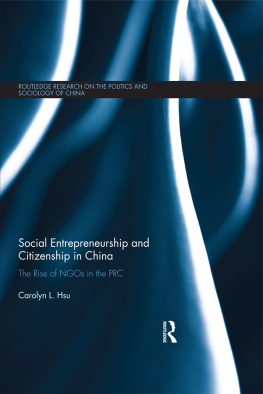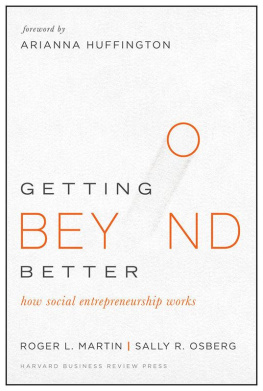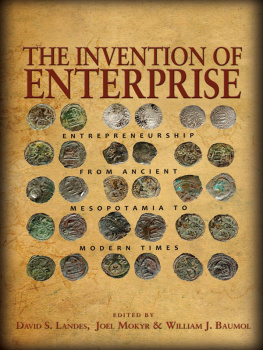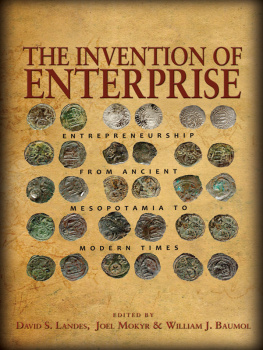Roger Martin and Sally Osberg have written a must-read on how social entrepreneurs are changing the way we make the future to deliver bigger, better results. Their lessons apply to any person or institution seeking to have real impactwhether from the top down or the bottom up. This book could not come at a more important time as the world launches a new agenda for development and inclusive growth.
KATHY CALVIN, President and CEO, United Nations Foundation
This definitive book, rich with the inspiring stories of successful social entrepreneurs and accompanied by persuasively lucid analysis, points the way for bringing about real change on the ground.
JOEL FLEISHMAN, Professor of Law and Public Policy Studies, Duke University
Getting Beyond Better lays the foundation for a new, rigorous way to conceptualize social entrepreneurship while providing an inspiring, practical guide for changemakers everywhere. A remarkable achievement. Essential reading.
MICHAEL GREEN, CEO, Social Progress Imperative; coauthor, Philanthrocapitalism
In Getting Beyond Better, Roger Martin and Sally Osberg remind us why they are the parents of the modern social entrepreneurship movement. Building on their pioneering 2007 Stanford Social Innovation Review article, the authors weave the narratives of remarkable people disrupting status quo systems that constrain opportunity for those left out and left behind. This book is a must-read for anyone working to bring about a more just and fair world. Prepare to be motivated and inspired.
DARREN WALKER, President, Ford Foundation
Getting
Beyond
Better
Getting
Beyond
Better
How Social Entrepreneurship Works
Roger L. Martin and
Sally R. Osberg
HARVARD BUSINESS REVIEW PRESS
Boston, Massachusetts
HBR Press Quantity Sales Discounts
Harvard Business Review Press titles are available at significant quantity discounts when purchased in bulk for client gifts, sales promotions, and premiums. Special editions, including books with corporate logos, customized covers, and letters from the company or CEO printed in the front matter, as well as excerpts of existing books, can also be created in large quantities for special needs.
For details and discount information for both print and ebook formats, contact .
Copyright 2015 Roger L. Martin and Sally R. Osberg
All rights reserved
No part of this publication may be reproduced, stored in or introduced into a retrieval system, or transmitted, in any form, or by any means (electronic, mechanical, photocopying, recording, or otherwise), without the prior permission of the publisher. Requests for permission should be directed to , or mailed to Permissions, Harvard Business School Publishing, 60 Harvard Way, Boston, Massachusetts 02163.
The web addresses referenced in this book were live and correct at the time of the books publication but may be subject to change.
Library of Congress Cataloging-in-Publication Data
Martin, Roger L.
Getting beyond better : how social entrepreneurship works / Roger L. Martin and Sally R. Osberg ; foreword by Arianna Huffington.
pages cm
ISBN 978-1-63369-068-4 (hardback)
1. Social entrepreneurship. 2. Social change. I. Osberg, Sally R. II. Title.
HD60.M3672015
658.4'08dc23 2015016847
ISBN: 9781633690684
eISBN: 9781633690691
To try to make the future is highly risky. It is less risky,
however, than not to try to make it.
Peter Drucker
Contents
Foreword
Its always fascinating to talk with people who go beyond dreaming about changing the world, who roll up their sleeves and set about doing it. Roger Martin and Sally Osberg are two of these peopleand they know more of these people than most of us do. Through the Skoll Foundation and the Skoll World Forum on Social Entrepreneurship, they have hosted and sparked thousands of conversations with men and women from across the world who have experience and insights about how to move beyond our stale and stuck ways of thinking to bring different perspectives and new solutions to the multitude of crises we are facing.
This experience, together with extensive research into both the public and the private sectors, has led them to a set of principles about social entrepreneurship and its world-changing potential, and they offer those insights here. But this is not a textbook. Its a wonderful collection of stories about inspired and inspiring people who dont accept the prevailing definition of success, who set their sights on creating opportunities not only for material and professional success, but also for lives of well-being, wonder, wisdom, and giving.
Its tempting to think that these are extraordinary individuals who are capable of connecting all the dots in a flash of insight or a killer strategy, people who were born with a talent for solutions and the perseverance to see them through. But in real life, its not as straightforward as that. Each story involves a journey. Often these social entrepreneurs journeys begin with the recognition of injustice or suffering, inspiring them to tap into their own inner resources of wisdom to understand the root causes of the misery or injustice, and not only to envision a better way, but to build a model for change and then take that change to scale.
Read the stories closely and you will see how each of these innovators and leaders found renewal and inspiration by working with and staying close to people and communities they loved, people who could recharge their spirits and sense of mission, people who shared their sense of what is possible and helped them make it so.
Molly Melching went to Senegal to study, observed the many ways in which development assistance was missing the mark, and went on to immerse herself in village life until she had built enough knowledge and trust to really begin her work. She developed and expanded a program that engaged women in learning and reflecting on their own human rightswhich in turn sparked a growing repudiation of harmful customs and practices, including violence toward women and female genital cutting.
Andrea and Barry Coleman were shocked to discover that transportation was often the missing link in health care in Africa, even in places where governments and charities had invested in transportation needs. They drew on their passion for motorcycles to envision transportation as an integral part of the health system, supplying appropriate vehicles for different urban and rural needs, and the all-important maintenance that kept them reliable.
Adalberto Verssimo and Carlos Souza Jr. envisioned a time when Brazilian authorities and citizens could control deforestation in the Amazon. They designed a model that monitors the process, making it possible to know, in almost real time, where deforestation occurs.
Paul Farmer and his colleagues created a model for health care in which community health workers accompany patients through all stages of their treatment, helping them address the many issues that affect their well-being. His commitment to making quality health care available to everyone drove him to create not just a model but an academic and professional discipline in the worlds leading teaching hospitals, disseminated globally through the Institute for Health and Social Justice.
All of these leadersdisrupters, rebels, changemakersenvision the metrics of the change beyond the usual statistics of wealth, power, graduation rates, decreases in disease, or incarceration. They focus their attention not just on relieving the symptoms of a social problem, but on finding ways to get to the root causes and address them, bringing about positive change on a grand scale in ways others can replicate.
My own experience with change, at the Huffington Post, began with the realization that online conversation could become a meeting place, a focus for participation where the ideas of our time would emerge and be shaped. And a lot of people who wanted to be part of that conversation, who society needed to be part of that conversation, were never going to be part of it unless there was a platform to make it easy for them. Remember, this was in 2005, before Facebook, which was born in 2004, had taken off in a big way, and before Twitter, Instagram, and all the other social media platforms that have sprung up since then that have given voice to the voiceless.
Next page




